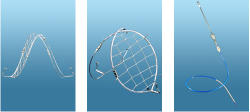
April 6, 2012 — Crux Biomedical announced that a recently completed pivotal trial of its Crux Vena Cava Filter (VCF) System with bi-directional retrieval was presented at the 2012 Society of Interventional Radiology (SIR) Annual Scientific Meeting, March 24-29, in San Francisco. Vena cava filters are designed to trap blood clots that can lead to potentially fatal pulmonary embolisms (PE) among patients at risk. In the study, deployment and retrieval each were achieved with a 98 percent success rate.
By obstructing the blood flow through the lungs, PE cause difficulty breathing, chest pain and palpitations. Each year in the United States, approximately 600,000 patients develop PE and an estimated 200,000 deaths occur.
The primary means of prevention and therapy of PE is systemic administration of anticoagulant agents, but is contraindicated in many patients. These patients require alternate treatments to reduce the ongoing PE risk, including vena cava filters – small devices that are inserted in the inferior vena cava, the main blood vessel returning blood from the lower part of the body to the heart, to prevent blood clots from reaching the lungs.
The Crux Biomedical VCF was designed to address the limitations of currently available VCFs, including perforation, migration and inability to retrieve. "Crux designed a device that is both more versatile and simple to use," said Tom Fogarty, M.D., founder of Crux Biomedical.
“The Crux device demonstrated an excellent safety profile,” added Robert R. Mendes, M.D., principal investigator of the study. “The clinical study evaluation has demonstrated the Crux VCF System device can be used safely for the prevention of recurrent PE.”
The recently completed pivotal trial, known as the RETRIEVE Clinical Study, was a prospective, single-arm, multinational investigational study to assess the safety, performance and efficacy of the Crux VCF System as both a retrievable and a permanent device. The trial included 125 patients at high risk for PE and was performed at 22 centers in the United States, Australia, New Zealand and Belgium.
In the study, the technical success rate of filter deployment was 98 percent; filter retrieval success was also 98 percent. The average retrieval time was 7 minutes, with the femoral approach used for retrieval in 70 percent of cases. By the six-month follow up of the study (CONFIRM), no embolizations, migrations, or fractures were observed.
The presentation at the SIR 2012, titled “The Results of the Crux Vena Cava Filter RETRIEVE Trial,” was authored by Mendes and during the IVC Filters session.
For a video of the Crux being deployed, click here.
For a video of the device being retrieved, click here.
The Crux VCF has received CE Mark approval for commercial use and is being studied in the United States under an approved investigational device exemption (IDE) study. 510(k) clearance for commercial distribution in the U.S. is pending.
For more information: www.cruxbiomedical.com


 January 05, 2026
January 05, 2026 









